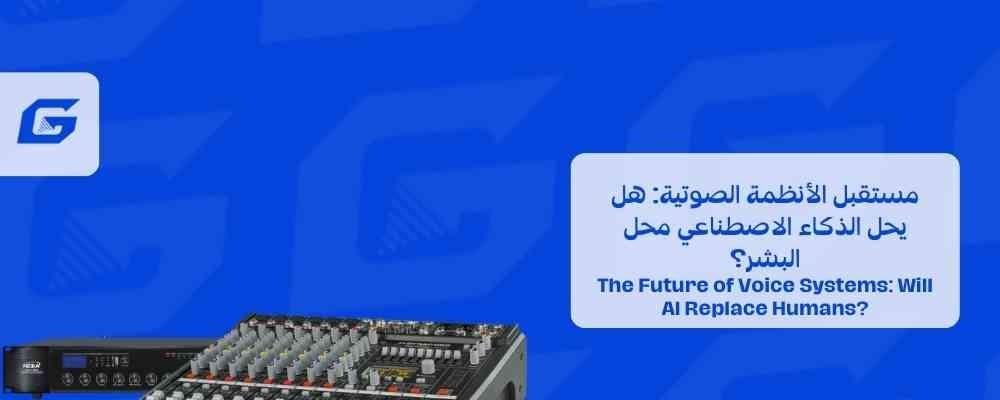Audio systems are constantly evolving, and with the rapid advancement of technology, artificial intelligence (AI) has become an integral part of the development of these systems. Many people wonder about the future of audio systems : Can AI replace humans in controlling and operating audio systems? In this article, we will take a look at how AI is impacting audio systems, and whether it could change the way engineers and technicians work in the future.
1. The impact of artificial intelligence in improving audio performance
One of the main benefits of using AI in audio systems is to improve audio performance more accurately and more effectively. Some systems now use AI algorithms to analyze audio in real time, helping to adjust frequencies and audio balance without the need for constant human intervention.
Examples of AI applications in audio:
- Automatic audio processing: AI can automatically adjust frequencies and reduce noise and distortion to ensure optimal sound quality .
- Sound pattern recognition: AI can use algorithms to recognize sound patterns in the environment and adjust audio systems based on that data.
Will artificial intelligence replace humans?
Although AI can improve the accuracy of voice performance, it is unlikely to completely replace humans in creative fields or in roles that require human expertise , such as sound design or setting up sound systems at live events .
2. Artificial Intelligence in Control and Automation
AI-powered audio systems automate many tasks that engineers and technicians once had to do manually. AI can adjust volume levels , choose optimal frequencies , or even adjust speaker settings based on ambient conditions.
Examples of voice automation using AI:
- Smart sound systems : These systems use artificial intelligence to choose the optimal sound distribution in large spaces such as theaters and halls .
- Automatic sound adjustment : AI can handle different sound environments at events and activities without constant human intervention.
Will artificial intelligence replace humans in this field?
Although AI can improve the automation of systems, human intervention is still necessary in many cases, especially in live events that require immediate response and creative solutions to unexpected audio problems.
3. Artificial Intelligence in Voice and Data Analytics
With the development of artificial intelligence technologies , it has become possible to collect and analyze audio data in a more accurate and efficient way . Artificial intelligence can monitor audio performance in real time, and provide detailed analysis of the sound quality in different spaces, which helps improve audio systems in the future.
Examples of audio data analysis using artificial intelligence:
- Audio data analysis at concerts : By using advanced microphones and artificial intelligence, the sound at large concerts can be analyzed and the sound systems can be continuously adjusted to achieve the best audio experience .
- Audio Monitoring : AI can monitor audio performance and adjust audio equalizers to avoid unwanted distortion or echo.
Can AI solve all audio problems?
Despite the improvements that AI offers, technical challenges , such as sound in unconventional spaces or unexpected acoustic problems , may require direct human intervention, as AI may not be able to adapt to some complex situations with the same flexibility as humans .
4. The role of artificial intelligence in enhancing audio creativity
One of the biggest advantages of AI in audio systems is enhancing creativity . In music production , audio recording , and broadcasting , AI can be used to generate new sound effects , create distinctive music , and even creatively enhance the sound of recordings .
How does artificial intelligence enhance audio creativity?
- Automatic music generation : AI can generate innovative music and audio clips based on audio patterns and analysis.
- Improved audio performance : AI helps improve audio production by adjusting vocal layers and introducing new effects.
Will artificial intelligence replace humans in creativity?
While AI offers great tools for creativity , the human side is still essential in adding the creative touch and the ability to address human emotions in audio systems.
conclusion
Artificial intelligence technologies are rapidly changing various fields, including audio systems . From enhancing audio performance to automating audio systems and analyzing audio data, AI is a powerful and effective tool. But despite these advances, humans still play a major role in audio creation , solving complex problems , and interacting with audiences . In the future, AI is expected to collaborate with audio engineers to deliver the best audio experience .
Post Cover Description
Cover showing a sound engineer adjusting audio settings using an AI-enabled computer with smart audio analysis systems on screen, with a modern tech atmosphere reflecting the technological advancement in the audio field.

